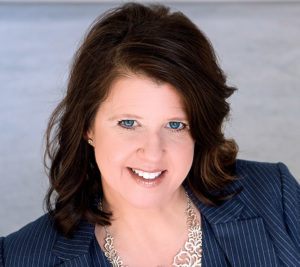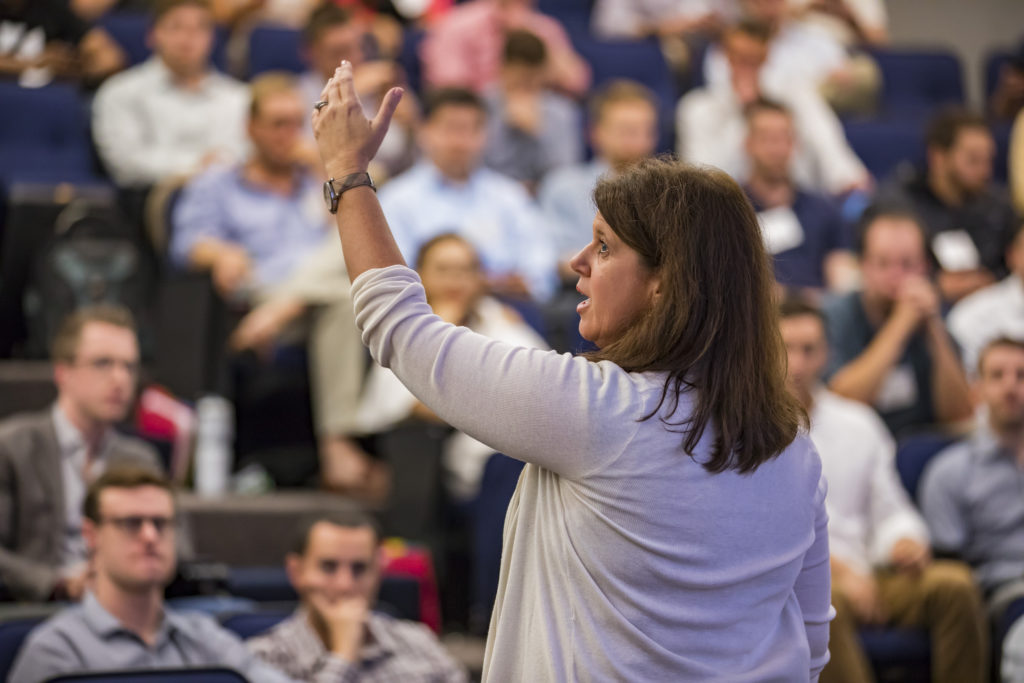By Kara Sherrer
K-Pace is her name, and no, she’s not a rapper — she’s a Professor for the Practice of Communication (full name: Kimberly Pace). And yes, Owen students can call her this, as she informs the newest class of MBA candidates during the first Communications Academy workshop.
Pace may not be a rapper, but she was trained in the performing arts as a singer-dancer-actress. In fact, Pace started her teaching career in the performing arts, instructing college classes while working on her masters in vocal performance.

Kimberly Pace
“I always say I bring a performance mindset to business. That was my sales proposition when I first came here (to Vanderbilt),” she said. “As a performer, I would never hire a coach to tell me how fabulous I was. You hire a coach to eat you alive and give you all the hard feedback.”
Pace has been teaching at Owen for more than a decade, and the business communications program has greatly evolved during that time. Core classes were much larger when she started, and specialized workshop weren’t even offered. She used to teach a class on how to use PowerPoint, and recorded students’ presentations on VHS tapes during her first year of teaching.
Fast forward to today, and the communications program at Owen has been expanded and repackaged as the Academy in order to give MBA students the comprehensive support they need. Instead of teaching PowerPoint, Pace instructs students in how to present their personas online. She still records students’ presentations (digitally, no VHS required) and makes students critique their own videos after the fact.
“I almost don’t have to give (students) feedback. If they just watch themselves, they’ll see it immediately,” she said. “They’ll be like, ‘why am I dancing the whole time? I’m trying to stand (and give a presentation).’”
Students actually start the Communications Academy during the summer, when they must take a communications skills self-assessment and submit a personal brand statement online. International students also attend an additional workshop in July as part of the U.S. Business Communication and Culture Program (USBCC).
I always say I bring a performance mindset to business. That was my sales proposition when I first came here. -Kimberly Pace
The Academy starts in earnest during orientation in August, when all incoming MBA students attend the first workshop and meet one-on-one with a writing coach to review their personal brand statements. Everyone is also required to take the Management Communications core class during Mod I.
In Mod II, students attend two workshops, one on professional business writing and one on an elective topic of their choice. Managerial Writing is also offered as elective course during Mod II for students who want to further improve.
The Academy may seem like a lot of work — and it is — but such communication expertise is critical for MBA candidates to advance in their careers, according to Nancy Lea Hyer, Associate Dean of the MBA Programs and Associate Professor of Operations Management.
“Communication skills are vital to success in a business career,” she said. “Being able to present and write clearly and persuasively is fundamental to being effective in any leadership position in any organization.”
While the Academy targets MBA candidates, a Communications Lab is also offered bi-weekly to all business students who want one-one-one consultations. In addition to managing the Lab, Pace also supports other Owen programs, including Executive Education, where she teaches courses like Persuasive and Influential Speaking and Communications Strategies for Senior Leadership.

Pace says all this effort pays off in real results, and that every year she sees students’ communication skills transformed by the end of the program.
“I do remember this gentleman…who was in the military in India. He would get up to speak, and he was very authoritative — everyone in the room listened to him — but he was basically yelling like a commander (no matter what he was saying),” she recalled.
Pace worked one-on-one with the student to match his voice and body language with the content of his speech. The student felt out of his comfort zone at first, but he was eager to learn, and made great progress during the Academy.
“He got up and did the next presentation with this amazing smile, and the whole class just erupted in clapping…by the end of the course, he was completely transformed,” Pace said.
My number one tip for communications would be to invest in increasing your emotional intelligence. -Kimberly Pace
While tone, facial expression, body language, and similar factors are critical to smooth presentations, Pace’s top recommendations for business communications are more broadly focused.
“My number one tip for communications would be to invest in increasing your emotional intelligence, specifically in self-awareness,” she said. “Make sure you really are seeing how you are coming across in your writing and your speaking, and make sure it’s what you intend.”
After that, she suggests that leaders focus on adapting their leadership and communications style to their audiences, rather than assuming that everyone communicates the same way they do.
“If I say something to you and it doesn’t get through, it doesn’t mean you’re not intelligent, it might be because of the way I communicated it,” she said. “If (students) can learn to adapt to that, they’ll be so much happier and so much more successful long term in their career.”